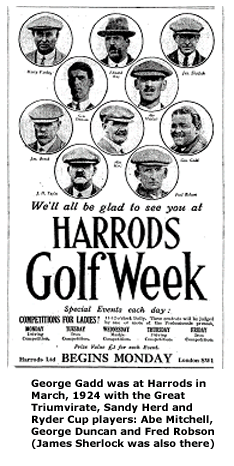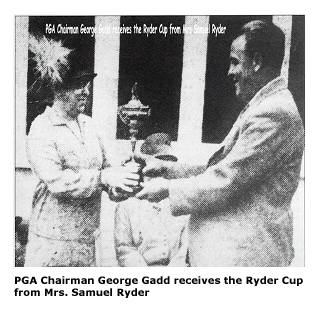 However,
the appeal fell several hundred pounds short of its target, with
only 216 of the 1750 golf clubs approached having responded. Most
club members were not inclined to finance their ‘servants’ on an all
expenses paid trip and their feelings were summed up in a letter to
Golf Illustrated: “I would no more send a professional player off to
America to play golf than I would my chimney sweep”. The magazine
and Ryder made up the shortfall and The Great Triumvirate – Vardon,
Taylor and Braid were asked to select the team: Abe Mitchell was
chosen to captain the team of Ted Ray, George Duncan, Charles
Whitcombe, Aubrey Boomer, Archie Compston, Fred Robson, Arthur
Havers, and George Gadd. However,
the appeal fell several hundred pounds short of its target, with
only 216 of the 1750 golf clubs approached having responded. Most
club members were not inclined to finance their ‘servants’ on an all
expenses paid trip and their feelings were summed up in a letter to
Golf Illustrated: “I would no more send a professional player off to
America to play golf than I would my chimney sweep”. The magazine
and Ryder made up the shortfall and The Great Triumvirate – Vardon,
Taylor and Braid were asked to select the team: Abe Mitchell was
chosen to captain the team of Ted Ray, George Duncan, Charles
Whitcombe, Aubrey Boomer, Archie Compston, Fred Robson, Arthur
Havers, and George Gadd.Golf
Illustrated editor, George Philpot was appointed team manager. He
wrote: “We have a team that carries confidence, led by one of the
greatest players the world has ever known, Abe Mitchell, but on this
rare and distinguished occasion, it is a sorry circumstance that the
nation has, for the most part, been so lacking in encouragement and
generosity.”
The gold ‘Ryder Cup’, (variously valued at 100 guineas to £250) was
commissioned from the famous jewellers, Mappin and Webb, topped with
the figure of a golfer in the likeness of Ryder’s personal tutor,
Abe Mitchell. Unfortunately Abe was unable to make the trip due to
his appendicitis. Ted Ray took over the captaincy and Channel
Islander Herbert Jolly followed later on the Majestic to fill the
gap. He had a fairly good crossing, but four days ahead his
team-mates were finding it very rough indeed.
 My brother was Chairman of the PGA in 1927 and he had the honour of
receiving the new trophy from Mrs. Samuel Ryder, which the team took
with them to America. In his speech George thanked Sam Ryder for his
support of professional golf, acknowledging his efforts to raise the
status and conditions of club pros and concluded by saying that the
team would spare no effort to bring the trophy back home. Sadly they
left it behind as the Americans triumphed by 9 ½ to 2 ½. My brother was Chairman of the PGA in 1927 and he had the honour of
receiving the new trophy from Mrs. Samuel Ryder, which the team took
with them to America. In his speech George thanked Sam Ryder for his
support of professional golf, acknowledging his efforts to raise the
status and conditions of club pros and concluded by saying that the
team would spare no effort to bring the trophy back home. Sadly they
left it behind as the Americans triumphed by 9 ½ to 2 ½.
The British lost the foursomes 3-1, their lone win coming from
Boomer and Whitcombe, who defeated Diegel and Mehlhorn 7&6. Diegel
and Bill Mehlhorn were friends and it was Leo Diegel who coined
Mehlhorn’s nickname of ‘Wild Bill’, which was not a comment on his
temperament but referred to his tendency to sometimes embark on a
wild spree of low scoring (often wearing a cowboy hat). In 1925 he
lost to Walter Hagen in the final of the US PGA, the second of
Hagen’s four consecutive victories. He must have known it was not
his day; after a 3-under 69 he was 3 down. [A golf chronicle records
that The Haig holed his opening tee shot, but that appears to be one
of the apocryphal Hagen stories (* p 50)].
In the Ryder Cup singles matches Duncan was the only winner, beating
Joe Turnesa 1 up and Whitcombe got the half against Gene Sarazen. My
brother George was to enter the record books as one of the ‘most
under-utilised internationals’. He was the first of the seven men to
be picked for the team over the years who were never to play a
match, so his record in the Ryder Cup statistics shows a row of
noughts. The history books record that he had suffered badly during
the very rough six-day crossing on the Aquitania - after his
experience during the war George was not the most enthusiastic of
sailors. He did not perform well in practise and was left out at his
own request.
[An accident forced George to withdraw after two rounds of that
year’s Open at St Andrews; he reached into his travel bag and badly
cut his hand on a ‘cut-throat’ razor, but there was another gutsy
performance from his brother Charles, who played all four rounds and
finished in the top thirty.
Bobby Jones retained the title, five shots ahead of joint 2nd placed
Aubrey Boomer and Fred Robson; joint 4th were Ernest Whitcombe-and
Joe Kirkwood, who George had soundly thrashed in that first match
against the Americans a year earlier.]
NEXT |
 However,
the appeal fell several hundred pounds short of its target, with
only 216 of the 1750 golf clubs approached having responded. Most
club members were not inclined to finance their ‘servants’ on an all
expenses paid trip and their feelings were summed up in a letter to
Golf Illustrated: “I would no more send a professional player off to
America to play golf than I would my chimney sweep”. The magazine
and Ryder made up the shortfall and The Great Triumvirate – Vardon,
Taylor and Braid were asked to select the team: Abe Mitchell was
chosen to captain the team of Ted Ray, George Duncan, Charles
Whitcombe, Aubrey Boomer, Archie Compston, Fred Robson, Arthur
Havers, and George Gadd.
However,
the appeal fell several hundred pounds short of its target, with
only 216 of the 1750 golf clubs approached having responded. Most
club members were not inclined to finance their ‘servants’ on an all
expenses paid trip and their feelings were summed up in a letter to
Golf Illustrated: “I would no more send a professional player off to
America to play golf than I would my chimney sweep”. The magazine
and Ryder made up the shortfall and The Great Triumvirate – Vardon,
Taylor and Braid were asked to select the team: Abe Mitchell was
chosen to captain the team of Ted Ray, George Duncan, Charles
Whitcombe, Aubrey Boomer, Archie Compston, Fred Robson, Arthur
Havers, and George Gadd.
 My brother was Chairman of the PGA in 1927 and he had the honour of
receiving the new trophy from Mrs. Samuel Ryder, which the team took
with them to America. In his speech George thanked Sam Ryder for his
support of professional golf, acknowledging his efforts to raise the
status and conditions of club pros and concluded by saying that the
team would spare no effort to bring the trophy back home. Sadly they
left it behind as the Americans triumphed by 9 ½ to 2 ½.
My brother was Chairman of the PGA in 1927 and he had the honour of
receiving the new trophy from Mrs. Samuel Ryder, which the team took
with them to America. In his speech George thanked Sam Ryder for his
support of professional golf, acknowledging his efforts to raise the
status and conditions of club pros and concluded by saying that the
team would spare no effort to bring the trophy back home. Sadly they
left it behind as the Americans triumphed by 9 ½ to 2 ½.